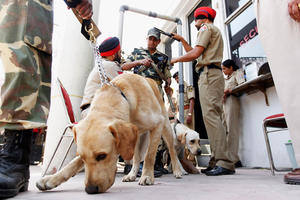K-9 forceHighly-trained Indian K-9s join counterterror forces
The Indo-Tibetan Border Police (ITBP) has a highly-trained unit in its force unlike any other in the world; police handlers have taught six Labradors to carry explosives in their teeth, sneak into terrorist lairs, plant remote-controlled bombs, hide secret cameras, interpret body language, and understand English and Hindi

ITBP's Labrador's can plant explosives, listening devices // Source: bleacherreport.com
The Indo-Tibetan Border Police (ITBP)has a highly-trained unit in its force unlike any other in the world.
Police handlers have taught six Labradors to carry explosives in their teeth, sneak into terrorist lairs, plant remote-controlled bombs, hide secret cameras, interpret body language, and understand English and Hindi.
“It’s the first time in India such a dog squad has been successfully trained in dropping of bombs, video and audio devices and other equipment inside enemy hideouts. They will be carrying them in their mouth and drop it inside the suspected hideout and when they report back to their handler and commander, then only the next step will be taken – triggering the blast through remote control,” said DK Pandey, an ITBP spokesman.
In addition, the dogs have been taught to snatch and retrieve weapons from enemy suspects and determine whether they are alive or dead following an attack.
The Labradors have even been trained to understand the scope of the mission. “If there are five enemies inside a hideout the trainer will say ‘three plus two’ and the dog will bark five times,” Pandey said.
Dilip Trivedi, ITBP’s additional director general, said the dogs would be deployed in situations where it was too dangerous to send officers.
“During an encounter with an enemy, if our soldiers are under fire and unable to reach the enemy’s hideout, say a building, these dogs can approach the target and secretly plant explosives. When it goes off, the terrorists would be exposed and thus easily targeted. As they are smaller in size to men, these canines are not easily spotted by the enemy. According to the situations, they further lower themselves and approach targets by crawling,” Trivedi explained.
“Using these dogs would minimize casualties of our soldiers during a confrontation with an enemy. These canines are specially trained to target terrorist hideouts with deadly precision,” he added.
Animal rights activists have voiced concerns over the use of dogs in the battlefield, but Pandey said the team works to ensure that the dogs are safe and well-protected.
“The safety of the dogs will be ensured before setting them off from a mission,” he said. “They are great assets for the force and it takes around one year to train them. Apart from healthy diet the dogs have to wear specialized jackets for safety.”
So far only six Labradors have been trained to complete these types of special missions, but Trivedi hopes that more will join their ranks soon.
“This is just the beginning of an experiment to make our forces more efficient and stronger. Presently, it is a small squad of six Labradors only. Dogs of other breeds can also be trained for this purpose,” Trivedi said.
